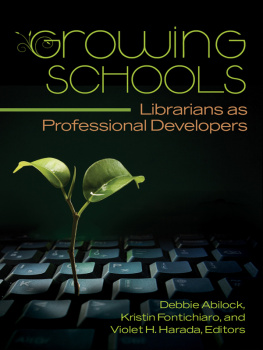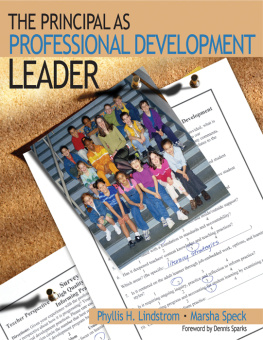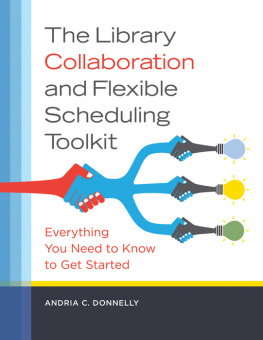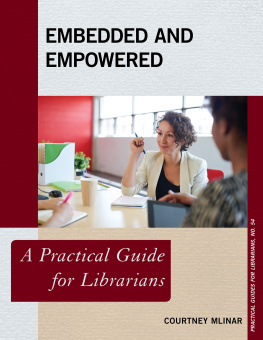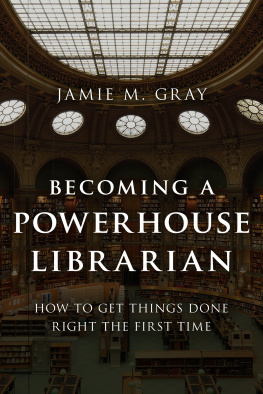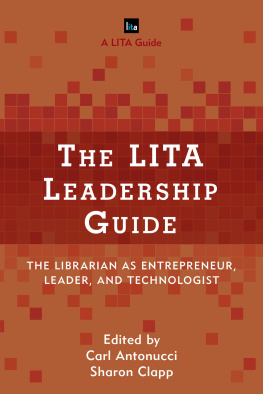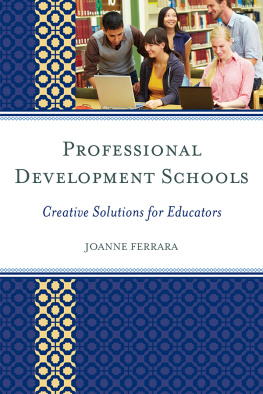Adult Learners
Professional Development and the School Librarian
Carl A. Harvey II

Copyright 2012 by Carl A. Harvey II
All rights reserved. No part of this publication may be reproduced, stored in a retrieval system, or transmitted, in any form or by any means, electronic, mechanical, photocopying, recording, or otherwise, except for the inclusion of brief quotations in a review, or reproducibles, which may be copied for classroom and educational programs only, without prior permission in writing from the publisher.
Library of Congress Cataloging-in-Publication Data
Harvey, Carl A.
Adult learners : professional development and the school librarian / Carl A. Harvey II.
pages cm
Includes bibliographical references and index.
ISBN 978-1-61069-039-3 (pbk.) ISBN 978-1-61069-040-9 (ebook)
1. School librariansProfessional relationships. 2. Libraries and teachers. 3. TeachersIn-service training. 4. School librariansIn-service training. 5. Technological literacyStudy and teaching (Continuing education) 6. Career development. 7. School improvement programs. 8. Educational leadership. I. Title.
Z682.4.S34H38 2012
027.8092dc23
2012020230
ISBN: 978-1-61069-039-3
EISBN: 978-1-61069-040-9
16 15 14 13 12 1 2 3 4 5
This book is also available on the World Wide Web as an eBook.
Visit www.abc-clio.com for details.
Libraries Unlimited
An Imprint of ABC-CLIO, LLC
ABC-CLIO, LLC
130 Cremona Drive, P.O. Box 1911
Santa Barbara, California 93116-1911
This book is printed on acid-free paper
Manufactured in the United States of America
Contents
Illustrations
Acknowledgments
First and foremost a big thank you to my family who consistently and without hesitation supports every new adventure.
This book focuses so much on teachers, and I can think of no better group of educators than the teachers at North Elementary School. Ten years ago I came to North and walked through the building and thought, I can work here! In that five-minute tour, I knew this was a place I could be happy. I never dreamed what an opportunity it was going to be for me. Each and every day I learn something new from these master teachers, and it is because of their willingness to try new things and embrace the concept of the 21st-century library program that our school library program has soared.
Finally, thanks to all the wonderful folks at ABC-CLIO and the Libraries Unlimited/Linworth imprints who have supported my efforts to share the experiences Ive had in the school library. Their support, guidance, and encouragement have been unwavering, and I cant thank them enough for all they have done.
Introduction
When I was student teaching, one of the major projects we worked on was a grant for technology in the school. Included in this grant was a huge amount of professional development. It was a wonderful experience for me just starting out to be involved in a project on such a grand scale. But Ill never forget the comment one of the grant team members made: Teaching kids is easy compared to teaching teachers!
Im not sure that is necessarily true. Staff can sometimes be a tougher group to engage than a group of kids, but, for example, wouldnt both students and staff have the following questions about anything they are learning?
Is it relevant (to my job/future)?
Is the training engaging?
Is there sufficient support for when I need help?
Can I make connections to what Ive learned in the past?
Both staff and students would expect/deserve to get satisfactory answers to all those queries. It is important that school librarians take these questions into account when planning professional development opportunities.
Why would school librarians be involved in providing professional development? In Empowering Learners: Guidelines for School Library Programs published by the American Association of School Librarians (AASL) in 2009, one of the three main sections focused on leadership. In this economy and the changing reality of todays education, school librarians have to be leaders in their schools. It is no longer optional. For school librarians to thrive in this economy and changing reality, they have to be leaders that are at the forefront of everything happening in the school. One way to be part of the leadership team in the school is to be actively involved in professional development.
AASLs mission statement for the school library program does not limit it to just the work school librarians do with students. When it talks about effective users of ideas and information, it says both students and staff. That last part is a key component because the school library program has a responsibility to the staff as well. Professional development is the vehicle we use to get to our staff. This also expands beyond teachers to include administrators, support staff, and so on. Any member of the school community should feel one of the best places to go when they need help and guidance is to the school librarian!
School librarians are experts in literature, literacy, technology, and a host of other areas (depending on their background). Librarians have to take advantage of those skill sets and put them to good use in their schools. When you as the school librarian share your expertise, you provide an opportunity to put the school library program up front and center before the audience. Your principal becomes aware. Your teachers become aware. And with that awareness, you are showing them the real power of what the library program can do. These are unsettled times, but school librarians have to step up and hit the ball out of the ballpark. School librarians have to paint a vision for those policy and decision makers about what school library programs of the 21st century are all about. Providing professional development is a very visible way to do just that while at the same time providing an opportunity to put the school library program in front of those making the decisions.
In the pages that follow, professional development is organized around a few major topics. will include a potential model/example for providing professional development.
Scattered throughout the book will be some scenarios. These are examples of things that have worked for librarians. They are meant to illustrate possibilities, but not to make the reader think they are the only paths possible. The hope is that as you are reading, youll think of opportunities that may work in your own school.
Why is professional development (PD) so important? Sometimes all the things that are on a school librarians plate can seem overwhelming. Isnt PD just one more thing? However, as school librarians look at how they ingrain themselves into the fibers of the school, it is important that they weave themselves in at all possible points. Focusing on instruction and professional development means letting go and not worrying about other more administrative tasks such as making sure that all the books are shelved every day. Who cares? The world wont come to an end if they arent. Working with students and teachers is way more important. If you have a fixed schedule and no help, how can you provide professional development? Align PD to match what you are teaching the students to cut down on some of the planning. You might have to offer it before or after school, but youve already put in the work of learning and planning to use it with kids, so transferring it to work with adults might also be successful and you wont have to learn something else for them.


